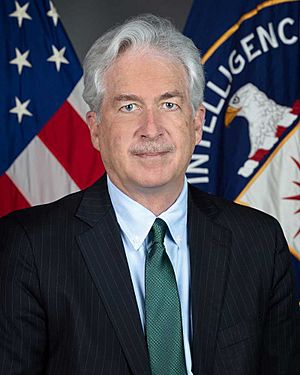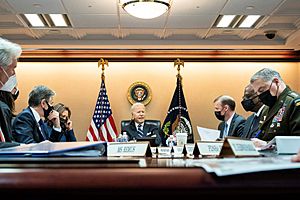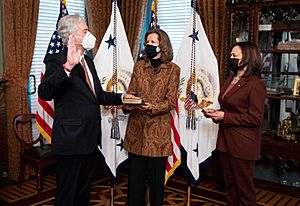William J. Burns (diplomat) facts for kids
William Joseph Burns (born April 11, 1956) is an American diplomat who has served as the 8th Director of the Central Intelligence Agency (CIA) since March 19, 2021. He was nominated for this important role by President Joe Biden. Before leading the CIA, Burns had a long and distinguished career in the United States Foreign Service, working as a diplomat for 32 years. He held many key positions, including United States Deputy Secretary of State from 2011 to 2014. He also served as the U.S. ambassador to countries like Jordan and Russia. After retiring from the Foreign Service in 2014, he became the president of the Carnegie Endowment for International Peace, a think tank focused on global peace.
Quick facts for kids
William J. Burns
|
|
|---|---|

Official portrait, 2021
|
|
| 8th Director of the Central Intelligence Agency | |
| In office March 19, 2021 – January 20, 2025 |
|
| President | Joe Biden |
| Deputy | David S. Cohen |
| Preceded by | Gina Haspel |
| Succeeded by | John Ratcliffe |
| 17th United States Deputy Secretary of State | |
| In office July 28, 2011 – November 3, 2014 |
|
| President | Barack Obama |
| Preceded by | James Steinberg |
| Succeeded by | Antony Blinken |
| Acting United States Secretary of State | |
| In office January 20, 2009 – January 21, 2009 |
|
| President | Barack Obama |
| Preceded by | Condoleezza Rice |
| Succeeded by | Hillary Clinton |
| 20th Under Secretary of State for Political Affairs | |
| In office May 13, 2008 – July 28, 2011 |
|
| President | George W. Bush Barack Obama |
| Preceded by | R. Nicholas Burns |
| Succeeded by | Wendy Sherman |
| United States Ambassador to Russia | |
| In office November 8, 2005 – May 13, 2008 |
|
| President | George W. Bush |
| Preceded by | Alexander Vershbow |
| Succeeded by | John Beyrle |
| Assistant Secretary of State for Near Eastern Affairs | |
| In office June 4, 2001 – March 2, 2005 |
|
| President | George W. Bush |
| Preceded by | Edward S. Walker Jr. |
| Succeeded by | David Welch |
| United States Ambassador to Jordan | |
| In office August 9, 1998 – June 4, 2001 |
|
| President | Bill Clinton George W. Bush |
| Preceded by | Wesley Egan |
| Succeeded by | Edward Gnehm |
| 17th Executive Secretary of the United States Department of State | |
| In office January 16, 1996 – February 27, 1998 |
|
| President | Bill Clinton |
| Preceded by | Kenneth C. Brill |
| Succeeded by | Kristie Kenney |
| Personal details | |
| Born |
William Joseph Burns
April 11, 1956 Fort Bragg, North Carolina, U.S. |
| Political party | Independent |
| Spouse | Lisa Carty |
| Children | 2 |
| Education | La Salle University (BA) St John's College, Oxford (MPhil, DPhil) |
| Diplomatic service | |
| Allegiance | United States |
| Service | U.S. Department of State |
| Years of service | 1982–2014 |
| Rank | Career Ambassador |
Contents
Early Life and Education
William J. Burns was born in 1956 in Fort Bragg, North Carolina. His father, William F. Burns, was a major general in the United States Army and also worked in government roles related to arms control.
Burns attended Trinity High School in Camp Hill, Pennsylvania, graduating as the top student in 1973. He then studied history at La Salle University, finishing with honors in 1978. He received a Marshall Scholarship, which allowed him to study at the University of Oxford in England. At Oxford, he earned advanced degrees in international relations. His doctoral thesis, completed in 1985, focused on economic aid and American policy toward Egypt. While at Oxford, he also played on the men's basketball team.
Career in Diplomacy
Joining the Foreign Service
Burns began his career in the United States Foreign Service in 1982. The Foreign Service is a group of diplomats who represent the U.S. government in other countries. They work to build relationships, negotiate agreements, and protect American interests abroad.
Key Diplomatic Roles
Over his 32-year career, Burns held many important positions:
- He was the United States Deputy Secretary of State from 2011 to 2014. This is a very high-ranking position in the United States Department of State.
- Before that, he served as Under Secretary of State for Political Affairs from 2008 to 2011.
- He was the U.S. ambassador to Russia from 2005 to 2008.
- He also served as the U.S. ambassador to Jordan from 1998 to 2001.
- He was the Assistant Secretary of State for Near Eastern Affairs from 2001 to 2005.
- Burns also worked closely with Secretaries of State Warren Christopher and Madeleine Albright.
In 2008, President George W. Bush nominated Burns to be a United States Foreign Service Career Ambassador. This is the highest rank a diplomat can achieve in the U.S. Foreign Service, and it is rarely given.
Important Diplomatic Efforts
Burns was involved in many significant diplomatic efforts. For example, in 2013, he helped lead secret talks with Iran. These talks eventually led to an important international agreement about Iran's nuclear program. His skills in diplomacy were highly praised, with one article calling him a "secret diplomatic weapon" for tackling tough foreign policy challenges.
After retiring from the Foreign Service in 2014, Burns became the president of the Carnegie Endowment for International Peace. This organization works to promote peace and cooperation around the world through research and discussion.
Leading the Central Intelligence Agency
Nomination and Confirmation
On January 11, 2021, President Joe Biden announced his plan to nominate William Burns to be the Director of the Central Intelligence Agency (CIA). The CIA is a U.S. government agency responsible for gathering intelligence and conducting covert operations abroad to protect national security. President Biden stated that Burns believed intelligence should be fair and not influenced by politics.
Burns's nomination was approved by the Senate Intelligence Committee and then confirmed by the full Senate on March 18, 2021. He officially became the Director of the CIA on March 19, 2021.
Key Focus Areas
As CIA Director, Burns has focused on several important global issues:
- He has stated that the "adversarial, predatory Chinese leadership poses our biggest geopolitical test." He noted that China is working to strengthen its abilities to gain intellectual property and expand its global influence.
- In 2021, he was involved in discussions about the withdrawal of U.S. troops from Afghanistan. He met with Taliban leaders to discuss the timeline for the military departure.
- In late 2021, Burns traveled to Moscow to warn Russian officials that the United States believed President Vladimir Putin was considering a full-scale invasion of Ukraine. He warned that such an invasion would have serious consequences for Russia.
- In 2022, he oversaw the operation that resulted in the death of terrorist leader Ayman al-Zawahiri.
- In 2023, Burns made a secret visit to China to help ease tensions between the two countries.
- Following the start of the Gaza war, Burns worked to help negotiate a deal with Hamas to secure the release of Israeli hostages.

Awards and Recognition
William Burns has received many awards for his long and successful career in public service. These include:
- Three Presidential Distinguished Service Awards.
- Several awards from the United States Department of State, including three Secretary's Distinguished Service Awards.
- The Department of Defense Award for Distinguished Public Service.
- The U.S. Intelligence Community Medallion and the CIA's Agency Seal Medal.
He was also recognized by Time magazine as one of the "50 Most Promising American Leaders Under Age 40" in 1994. In 2013, Foreign Policy magazine named him "Diplomat of the Year." He has also received honorary degrees and is a member of the American Academy of Arts and Sciences.
International Honors
Burns has also received honors from several foreign governments, recognizing his contributions to international relations:
- France: Commandeur, Legion of Honour
- Germany: Knight Commander, Order of Merit
- Japan: Grand Cordon, Order of the Rising Sun
- Jordan: First Order, Al Kawkab Medal
- Norway: Commander with star, Royal Order of St Olav
Personal Life
William Burns is married to Lisa Carty, who is also a former diplomat and now works for the United Nations Office for the Coordination of Humanitarian Affairs. They have two daughters. Burns is fluent in English, French, Russian, and Arabic.
See also
 In Spanish: William Joseph Burns para niños
In Spanish: William Joseph Burns para niños


